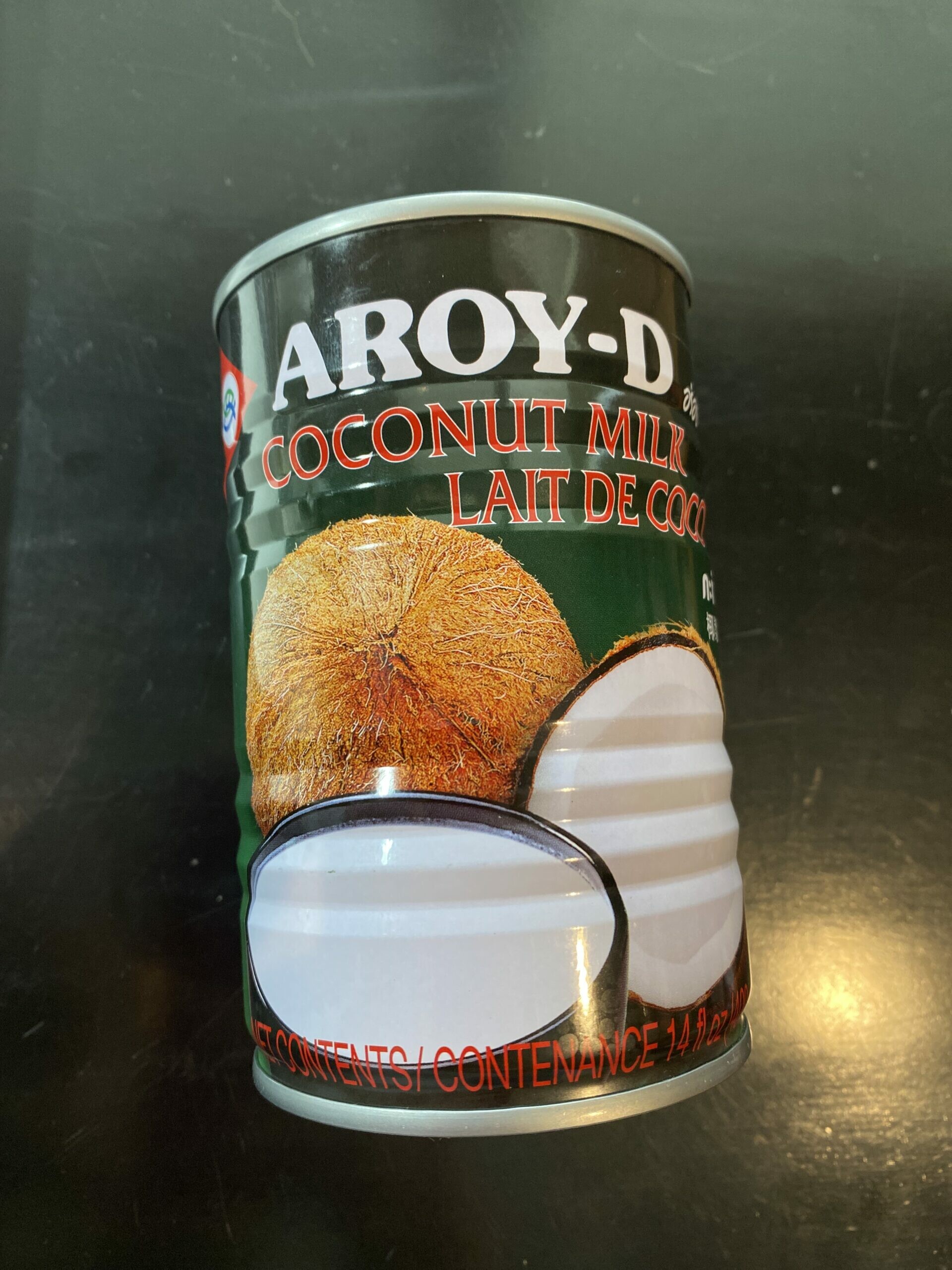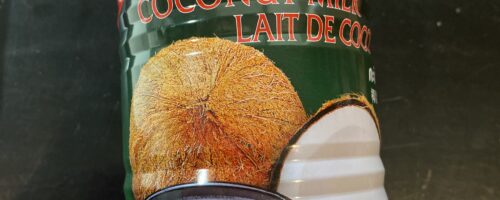
155/1 MOO 1, THEPARAK RD., BANG SAO THONG, SAMUT PRAKAN 10570, THAILAND
How is it produced?
This can of coconut milk starts on a variety of coconut farms in Thailand and employs and contacts local famers, citizens and migrants to work the fields and harvest the large clusters of coconuts on often genetically modified shorter trees (Thai Agri Food Public Company Limited, N.D & Pratruangkrai, 2020).
After harvesting, the coconuts are moved to another batch of workers near the farm that remove the copra cake, shells, water and finally remove the meat (Thai Agri Food Public Company Limited, N.D & Feinstein, 2020). I wasn’t able to find the specific organizations that use/buy the by-product, but most coconut farms sell and utilize the by-products and in the corporations “how we make it” video we see this breakdown process (Thai Agri Food Public Company Limited, N.D & Feinstein, 2020).
After the meat (or water) is extracted it is quickly shipped to manufacturing plants in Vietnam, Malaysia, or other parts of Thailand where it is processed and turned into coconut milk, oil, cream, paste and other coconut products (Open Food Facts, n.d & Thai Agri Food Public Company Limited, n.d).
Describe the supply chain to the store shelf in Canada:
There are many packaging companies that can and pack different products, many were outside of the country that manufactured the product (Open Food Facts, n.d & Thai Agri Food Public Company Limited, n.d). Finished products both fresh, dried and frozen are shipped to over 70 countries in 7 different continents and distributed to local markets like my own (Thai Agri Food Public Company Limited, n.d). In sum, farmers harvest coconuts and prep them in Thailand, either Thailand or surrounding states manufacture the individual products and package them, and finally they are transported around the world (the 7 major continents) and then distributed to grocery suppliers who stock various stores across the 70 countries (Thai Agri Food Public Company Limited, n.d).
What is the power balance between the producer and seller?
Thailand is in a subordinate position to transnational corporations and western states in the international market because of their cheap exports and lack of national economic protection. For example, PETA, a well-known western animal rights group, discovered the traditional practice of using monkeys to harvest coconuts and that put Thailand on the chopping block; PETA began urging western markets and consumers to boycott Thailand’s coconut industry because of the abuse of monkeys (Murphy, 2018 & Nguyen, 2020 & Pratruangkrai, 2020). Granted, some of it did constitute abuse but on the very few small traditional farms that do use monkeys they are often treated fairly like other livestock and animals that are used for work (Murphy, 2018 & Nguyen, 2020 & Pratruangkrai, 2020). Mass scale abuse with these large and often aggressive monkey’s is simply not feasible like PETA makes it out to be (Pratruangkrai, 2020).
The exaggerated use of monkey’s in Thailand coconut industry led to the cancelling of coconut product orders from Thailand altogether by major suppliers and brands like Waitrose, Ocado, Costco and Walgreens and the UK and U.S (some of the largest consumers of coconuts globally) (Pratruangkrai, 2020 & Thanthong-Knight and Chuwiruch, 2020). International retailers like German supermarket Tegut, Ahold Delhaize and Albert Heijn also stopped purchasing Thailand coconut products in fear of selling tainted monkey labour products and getting cancelled by animal rights activists (Nguyen, 2020).
For these corporate conglomerates and western states, it was simply losing a single coconut milk brand from their extensive globalized shelves (many brands from many countries available). On the contrary, Thailand is one of the world’s largest exporters of coconut products and mass price droppings meant losing over $112 million in exports and threatening the livelihood of more than 163,000 coconut farmers (this figure does not include the local “Shuckers” or manufacturing employees) (Pratruangkrai, 2020).
This is a prime example of some systematic political problems plaguing Thailand. Economic globalization and neoliberal policy as parts of the advanced global economy has exposed Thailand to volatile changes in politicized markets. One PETA article made key western states damage local markets almost overnight through cutting off trade to producer who do not even use monkey labour. Thailand is disproportionally disadvantaged by transnational corporations, western states and international economic institutions like the WTO who ignore the blatant biases.
Can you recommend changes to the system to improve the balance?
The WTO, GATT and other economic institutions need to be reevaluated on how they interact with economically developing states. Western voices and opinion dominate the discussion and states like Thailand often get trampled over because of a lack of political power and NGO advocacy groups. Globalization as it stands is clearly not benefitting countries equally; a redistribution of funds and new trade policy can protect developing countries from volatile market trends. A cap on mass consumerism could help the environment and create equal competition between countries on exports. Having more expensive export costs in developing countries can slow exploitive consumerism while putting export dollars back into developing countries. The “race to the bottom” is only going to be slowed by extreme revisions to our global market. This will mean removing monopolies from transnational corporations and ensuring that redistributed funds go to local producers and industries (not to unstable governments who have historically not been able to get countries back on track like Thailand and the Philippines with SAPs). I don’t believe I have a set answer, no one does, but it is clear from this one can of coconut milk that globalization is not befitting everyone.
References/Resources:
References
Ellwood, W. (2015). Chapters 2–5 & 7. In Globalization: Buying and selling the world (4th ed.). Between the Lines.
NGUYEN, T. (2020, July 08). Western retailers boycott Thai coconuts over inhumane monkey labour. Retrieved October 03, 2021, from https://vietnamtimes.org.vn/western-retailers-boycott-thai-coconuts-over-inhumane-monkey-labour-22090.html
Open Food Facts. Aroy-D, 100% coconut milk, original – 250ml. (n.d.). Retrieved October 04, 2021, from https://world.openfoodfacts.org/product/8851613101378/aroy-d-100-coconut-milk-original
Pratruangkrai, P. (2020, July 16). Focus: Thai coconut farmers reject monkey abuse charges, suffer lost income. Retrieved October 03, 2021, from https://english.kyodonews.net/news/2020/07/438857ee536a-focus-thai-coconut-farmers-reject-monkey-abuse-charges-suffer-lost-income.html
Reinecke, J. (2017). How can we prevent another Rana Plaza? Professor Juliane Reinecke [Interview]. Rocking Our Priors. https://soundcloud.com/user-845572280/how-can- we-prevent-another-rana-plaza-professor-juliane-reinecke
Thanthong-Knight and Chuwiruch Bloomberg News July 8, 2. (2020, July 09). ‘slave monkey’ scandal forces thailand to Rethink Coconut Trade. Retrieved October 03, 2021, from https://www.staradvertiser.com/2020/07/08/breaking-news/slave-monkey-scandal-forces-thailand-to-rethink-coconut-trade/
Thai Agri Food Public Company Limited. (n.d.). Retrieved October 04, 2021, from https://www.thaiagri.com/

